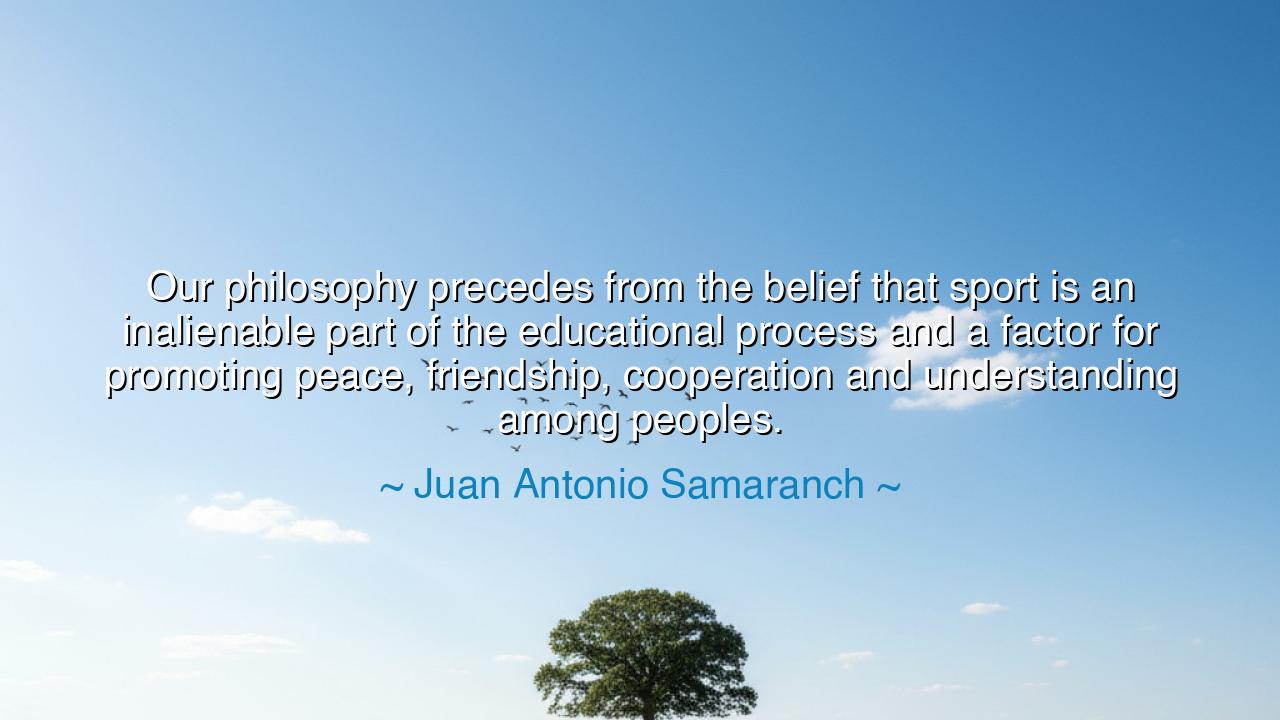
Our philosophy precedes from the belief that sport is an
Our philosophy precedes from the belief that sport is an inalienable part of the educational process and a factor for promoting peace, friendship, cooperation and understanding among peoples.






Hearken, O seeker of wisdom, to the enduring words of Juan Antonio Samaranch: “Our philosophy precedes from the belief that sport is an inalienable part of the educational process and a factor for promoting peace, friendship, cooperation and understanding among peoples.” Here is a vision that bridges body and soul, the classroom and the world, revealing sport not merely as contest, but as a sacred instrument for the cultivation of character, virtue, and communal harmony. Samaranch’s insight elevates physical exertion into a moral and social enterprise, asserting that the lessons learned on fields and courts ripple far beyond the arena, shaping hearts, minds, and nations.
The origin of this thought lies in Samaranch’s life-long dedication to the Olympic movement, where he witnessed firsthand how athletic pursuit could unite disparate peoples. Amid the cacophony of political strife and cultural division, he saw athletes from distant lands meet in friendship, compete in integrity, and forge bonds that transcended language and ideology. From this, he drew the enduring principle: that sport is not separate from education, but a vital extension of it—a crucible where discipline, respect, and teamwork are learned and internalized.
Consider the depth of this principle. To engage in sport is to engage with the self and with others. One learns resilience in defeat, humility in victory, and patience in the long hours of preparation. Yet these lessons are not contained within the individual; they radiate outward, teaching cooperation, fostering understanding, and nurturing the seeds of peace in the hearts of those who would otherwise remain strangers. The playing field becomes a sacred ground, a forum where the virtues of character are tested and displayed.
History offers luminous testimony. In 1936, amid the rising shadows of political extremism, Jesse Owens, an African-American athlete, triumphed in the Berlin Olympics. His victories, achieved with extraordinary skill and grace, not only challenged the ideology of oppression but also ignited friendship and respect across borders. The world witnessed how sport could transcend hatred, embodying the principles Samaranch extolled: the ability of athletic excellence to teach understanding and foster human connection even in the darkest of times.
Yet the lesson of Samaranch is not confined to global spectacles. Even within the smallest schools, local teams, or neighborhood games, sport is a medium of education and moral formation. Children learn to communicate, to honor rules, to support one another, and to celebrate collective achievement. In these microcosms, the seeds of peace, friendship, and cooperation are planted, teaching that the principles learned on the field echo into every corner of life, shaping how individuals engage with one another in broader society.
Consider, too, the story of the Rugby World Cup in 1995, where Nelson Mandela, a leader of profound vision, used the event to unite a post-apartheid South Africa. By supporting the national team and embracing the shared joy of sport, he fostered friendship and cooperation among a people long divided. This demonstrates the principle Samaranch speaks of: that sport, as an educational and social force, is capable of healing wounds, promoting understanding, and creating bonds where conflict once reigned.
From these reflections emerges a clear lesson: embrace sport not merely as a pastime, but as a vehicle for character, education, and social harmony. Practical actions follow: participate with integrity, honor the rules and the spirit of competition, celebrate the achievements of others, and seek the lessons that teamwork and effort impart. By doing so, one cultivates virtues that extend beyond the body into the mind and spirit, fostering peace and friendship in every arena of life.
Thus, as the ancients might counsel, let us heed Samaranch’s teaching: the field, the court, and the track are sacred classrooms, where cooperation, understanding, and human connection are learned in ways that transcend words. Let us carry these lessons into the wider world, allowing the principles of sport to illuminate our interactions, guide our communities, and nurture the enduring bonds of friendship and peace among peoples. In this endeavor, athletic pursuit becomes not mere contest, but a sacred enterprise, shaping the world through the education of the heart as well as the body.






AAdministratorAdministrator
Welcome, honored guests. Please leave a comment, we will respond soon